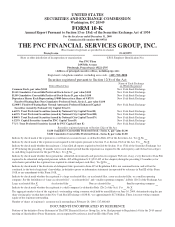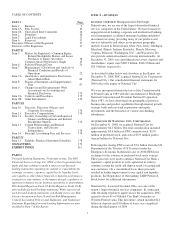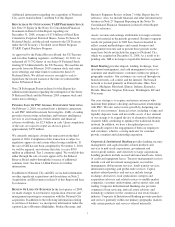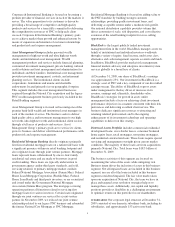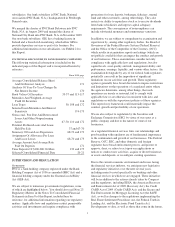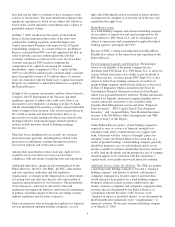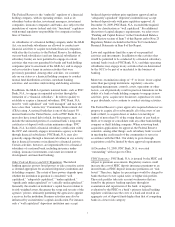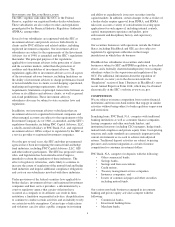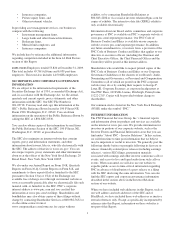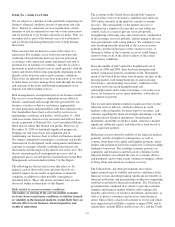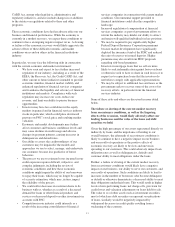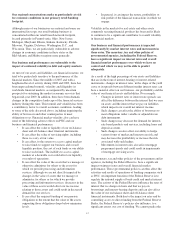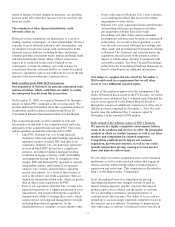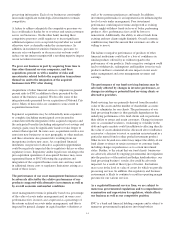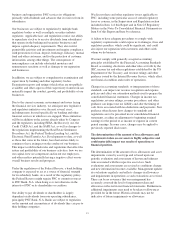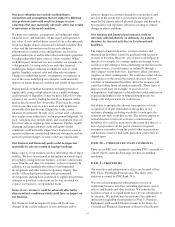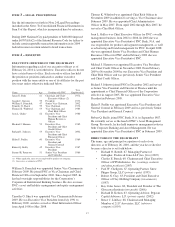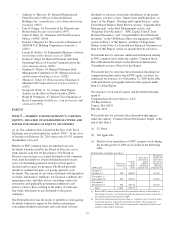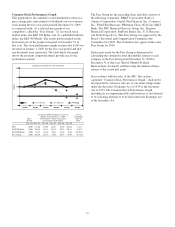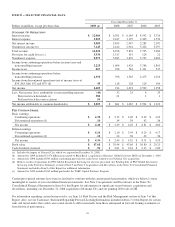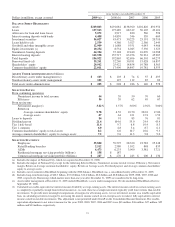PNC Bank 2009 Annual Report Download - page 15
Download and view the complete annual report
Please find page 15 of the 2009 PNC Bank annual report below. You can navigate through the pages in the report by either clicking on the pages listed below, or by using the keyword search tool below to find specific information within the annual report.CARD Act, among other legislative, administrative and
regulatory initiatives, and also include changes in or additions
to the statutes or regulations related to these and other
programs.
These economic conditions have had an adverse effect on our
business and financial performance. While the economy is
currently in a modest recovery, we expect these conditions to
continue to have an ongoing negative impact on us. A slowing
or failure of the economic recovery would likely aggravate the
adverse effects of these difficult economic and market
conditions on us and on others in the financial institutions
industry.
In particular, we may face the following risks in connection
with the current economic and market environment:
• We have seen and expect to face further increased
regulation of our industry, including as a result of the
EESA, the Recovery Act, the Credit CARD Act, and
other current or future initiatives intended to provide
economic stimulus, financial market stability and
enhanced regulation of financial services companies
and to enhance the liquidity and solvency of financial
institutions and markets. Compliance with such
regulation may increase our costs, reduce our
revenue, and limit our ability to pursue business
opportunities.
• Investors may have less confidence in the equity
markets in general and in financial services industry
stocks in particular, which could place downward
pressure on PNC’s stock price and resulting market
valuation.
• Economic and market developments may further
affect consumer and business confidence levels and
may cause declines in credit usage and adverse
changes in payment patterns, causing increases in
delinquencies and default rates.
• Our ability to assess the creditworthiness of our
customers may be impaired if the models and
approaches we use to select, manage, and underwrite
our customers become less predictive of future
behaviors.
• The process we use to estimate losses incurred in our
credit exposure requires difficult, subjective, and
complex judgments, including the review of
economic conditions and how these economic
conditions might impair the ability of our borrowers
to repay their loans, which may no longer be capable
of accurate estimation, which may, in turn, impact
the reliability of the process.
• We could suffer decreases in customer desire to do
business with us, whether as a result of a decreased
demand for loans or other financial products and
services or decreased deposits or other investments in
accounts with PNC.
• Competition in our industry could intensify as a
result of the increasing consolidation of financial
services companies in connection with current market
conditions. Governmental support provided to
financial institutions could alter the competitive
landscape.
• Increased regulation of compensation at financial
services companies as part of government efforts to
reform the industry may hinder our ability to attract
and retain well-qualified individuals in key positions.
• We may be required to pay significantly higher
Federal Deposit Insurance Corporation premiums
because market developments have significantly
depleted the insurance fund of the FDIC and reduced
the ratio of reserves to insured deposits. Higher
premiums may also result from FDIC proposals
regarding risk-based premiums.
• Investors in mortgage loans that we sell are more
likely to seek indemnification against losses on loans
or otherwise seek to have us share in such losses or to
request us to repurchase loans that the investors do
not believe comply with applicable representations.
• We may be subject to additional fees and taxes as the
government seeks to recover some of the costs of its
recovery efforts, in particular from the financial
services industry.
Some of these risks and others are discussed in more detail
below.
The failure or slowing of the current modest recovery
from recessionary conditions, as well as the lingering
effects of the recession, would likely adversely affect our
lending businesses and the value of the loans and debt
securities we hold.
Given the high percentage of our assets represented directly or
indirectly by loans, and the importance of lending to our
overall business, the aftermath of recessionary conditions is
likely to continue to have a negative impact on our business
and our results of operations as the positive effects of
economic recovery are likely to be slow and uneven in
spreading to our customers. This could adversely impact loan
utilization rates as well as delinquencies, defaults and
customer ability to meet obligations under the loans.
Further, a failure or slowing of the current modest recovery
from recessionary conditions would likely have a negative
impact on our business, our ability to serve our customers, and
our results of operations. Such conditions are likely to lead to
increases in the number of borrowers who become delinquent
or default or otherwise demonstrate a decreased ability to meet
their obligations under their loans. This would result in higher
levels of non-performing loans, net charge-offs, provision for
credit losses and valuation adjustments on loans held for sale.
The value to us of other assets such as investment securities,
most of which are debt securities or represent securitizations
of loans, similarly would be negatively impacted by
widespread decreases in credit quality resulting from a
weakening of the economy.
11


